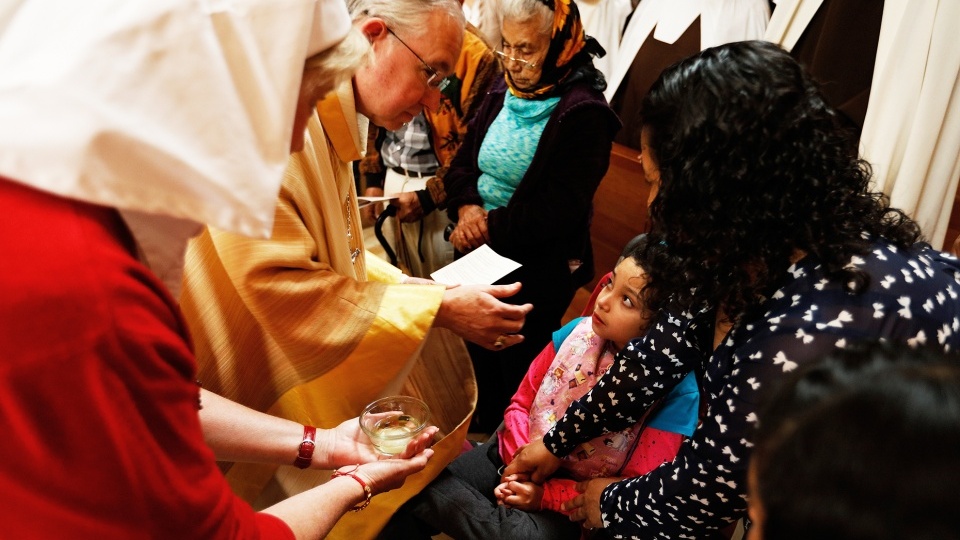SEARCH

The Sacrament of the Anointing of the Sick is administered to those who are dangerously ill, by anointing them on the forehead and hands with olive oil, or, if opportune, with another vegetable oil, properly blessed, and saying once only the following words: Per istam sanctam unctionem et suam piissimam misericordiam adiuvet te dominus gratia spiritus sancti, ut a peccatis liberatum te salvet atque propitius alleviet.The Catechism of the Catholic Church says pretty much the same thing, but gives us the form in English:
The Sacrament of Anointing of the Sick is given to those who are seriously ill by anointing them on the forehead and hands with duly blessed oil - pressed from olives or from other plants - saying, only once: "Through this holy anointing may the Lord in his love and mercy help you with the grace of the Holy Spirit. May the Lord who frees you from sin save you and raise you up." (CCC#1513)The Catechism continues:
Only priests (bishops and presbyters) are ministers of the Anointing of the Sick. It is the duty of pastors to instruct the faithful on the benefits of this sacrament. The faithful should encourage the sick to call for a priest to receive this sacrament. The sick should prepare themselves to receive it with good dispositions, assisted by their pastor and the whole ecclesial community, which is invited to surround the sick in a special way through their prayers and fraternal attention. (CCC #1516)Come back next week and we’ll look at the Graces that are received with this Sacrament.
To read all about the Sacraments, you don't need to go further than this blog site: Sacraments Part 1 and Part 2. Part 3 Baptism: Part 1, Part 2 and Part 3. Reconciliation Part 1, Part 2 and Part 3 Eucharist: Part 1, Part 2, Part 3 and Part 4. Confirmation: Part 1, Part 2, Part 3, Part 4 and Part 5. Marriage: Part 1, Part 2, Part 3, Part 4, Part 5, Part 6, Part 7, Part 8, Part 9 and Part 10. Ordination: Part 1, Part 2. Anointing of the Sick: Part 1, Part 2, Part 3
 Every week, Deacon Pedro takes a particular topic apart, not so much to explore or explain the subject to its fullness, but rather to provide insights that will deepen our understanding of the subject. And don’t worry, at the end of the day he always puts the pieces back together. There are no limits to deaconstructing: Write to him and ask any questions about the faith or Church teaching: [email protected]
Every week, Deacon Pedro takes a particular topic apart, not so much to explore or explain the subject to its fullness, but rather to provide insights that will deepen our understanding of the subject. And don’t worry, at the end of the day he always puts the pieces back together. There are no limits to deaconstructing: Write to him and ask any questions about the faith or Church teaching: [email protected]